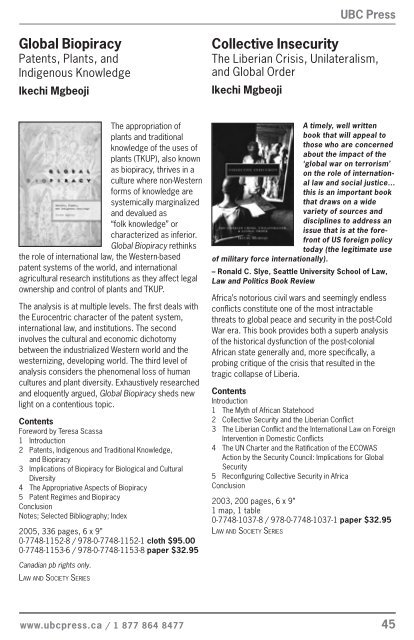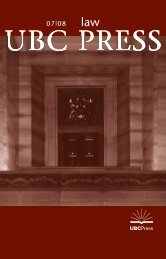In Search of Canadian Political Culture - UBC Press
In Search of Canadian Political Culture - UBC Press
In Search of Canadian Political Culture - UBC Press
Create successful ePaper yourself
Turn your PDF publications into a flip-book with our unique Google optimized e-Paper software.
<strong>UBC</strong> <strong>Press</strong><br />
Global Biopiracy<br />
Patents, Plants, and<br />
<strong>In</strong>digenous Knowledge<br />
Ikechi Mgbeoji<br />
Collective <strong>In</strong>security<br />
The Liberian Crisis, Unilateralism,<br />
and Global Order<br />
Ikechi Mgbeoji<br />
The appropriation <strong>of</strong><br />
plants and traditional<br />
knowledge <strong>of</strong> the uses <strong>of</strong><br />
plants (TKUP), also known<br />
as biopiracy, thrives in a<br />
culture where non-Western<br />
forms <strong>of</strong> knowledge are<br />
systemically marginalized<br />
and devalued as<br />
“folk knowledge” or<br />
characterized as inferior.<br />
Global Biopiracy rethinks<br />
the role <strong>of</strong> international law, the Western-based<br />
patent systems <strong>of</strong> the world, and international<br />
agricultural research institutions as they affect legal<br />
ownership and control <strong>of</strong> plants and TKUP.<br />
The analysis is at multiple levels. The first deals with<br />
the Eurocentric character <strong>of</strong> the patent system,<br />
international law, and institutions. The second<br />
involves the cultural and economic dichotomy<br />
between the industrialized Western world and the<br />
westernizing, developing world. The third level <strong>of</strong><br />
analysis considers the phenomenal loss <strong>of</strong> human<br />
cultures and plant diversity. Exhaustively researched<br />
and eloquently argued, Global Biopiracy sheds new<br />
light on a contentious topic.<br />
Contents<br />
Foreword by Teresa Scassa<br />
1 <strong>In</strong>troduction<br />
2 Patents, <strong>In</strong>digenous and Traditional Knowledge,<br />
and Biopiracy<br />
3 Implications <strong>of</strong> Biopiracy for Biological and Cultural<br />
Diversity<br />
4 The Appropriative Aspects <strong>of</strong> Biopiracy<br />
5 Patent Regimes and Biopiracy<br />
Conclusion<br />
Notes; Selected Bibliography; <strong>In</strong>dex<br />
2005, 336 pages, 6 x 9”<br />
0-7748-1152-8 / 978-0-7748-1152-1 cloth $95.00<br />
0-7748-1153-6 / 978-0-7748-1153-8 paper $32.95<br />
<strong>Canadian</strong> pb rights only.<br />
A timely, well written<br />
book that will appeal to<br />
those who are concerned<br />
about the impact <strong>of</strong> the<br />
‘global war on terrorism’<br />
on the role <strong>of</strong> international<br />
law and social justice…<br />
this is an important book<br />
that draws on a wide<br />
variety <strong>of</strong> sources and<br />
disciplines to address an<br />
issue that is at the forefront<br />
<strong>of</strong> US foreign policy<br />
today (the legitimate use<br />
<strong>of</strong> military force internationally).<br />
– Ronald C. Slye, Seattle University School <strong>of</strong> Law,<br />
Law and Politics Book Review<br />
Africa’s notorious civil wars and seemingly endless<br />
conflicts constitute one <strong>of</strong> the most intractable<br />
threats to global peace and security in the post-Cold<br />
War era. This book provides both a superb analysis<br />
<strong>of</strong> the historical dysfunction <strong>of</strong> the post-colonial<br />
African state generally and, more specifically, a<br />
probing critique <strong>of</strong> the crisis that resulted in the<br />
tragic collapse <strong>of</strong> Liberia.<br />
Contents<br />
<strong>In</strong>troduction<br />
1 The Myth <strong>of</strong> African Statehood<br />
2 Collective Security and the Liberian Conflict<br />
3 The Liberian Conflict and the <strong>In</strong>ternational Law on Foreign<br />
<strong>In</strong>tervention in Domestic Conflicts<br />
4 The UN Charter and the Ratification <strong>of</strong> the ECOWAS<br />
Action by the Security Council: Implications for Global<br />
Security<br />
5 Reconfiguring Collective Security in Africa<br />
Conclusion<br />
2003, 200 pages, 6 x 9”<br />
1 map, 1 table<br />
0-7748-1037-8 / 978-0-7748-1037-1 paper $32.95<br />
LAW AND SOCIETY SERIES<br />
LAW AND SOCIETY SERIES<br />
www.ubcpress.ca / 1 877 864 8477 45













